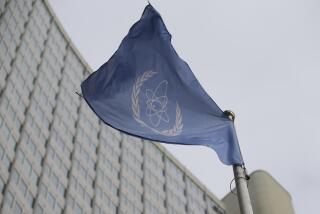U.S. Scoffs at Report on Iraqi A-Bomb Fuel
- Share via
WASHINGTON — U.S. officials Thursday greeted with skepticism a new report from United Nations inspectors that Iraq had produced far less nuclear weapons material than originally believed.
In addition, the U.N. special commission overseeing the scrapping of Iraq’s weapons of mass destruction issued a statement suggesting that the report by its own inspectors was not the final word. The commission called recent findings “preliminary,” saying they applied to only a few facilities.
Members of the U.N. inspection team, speaking in Baghdad on Wednesday, had said it appeared that allied air raids during the war had destroyed Iraq’s capacity to enrich uranium for use in atom bombs.
But Defense Secretary Dick Cheney and other senior officials said that Iraq’s assurances to the United Nations cannot be trusted. They again threatened Iraq with renewed American air attacks if Baghdad does not cooperate in identifying and destroying its weapons of mass destruction under terms of several U.N. resolutions.
“Anybody who tells you with any confidence how much nuclear material Iraq has is blowing smoke,” a senior government analyst said. “We learn new things with every inspection, with every day.”
Meanwhile, senior U.S. officials said Thursday that Iraqi President Saddam Hussein has launched a major purge of scores of key figures in the ruling Arab Baath Socialist Party, the military and regional governments, doing so at a level far beyond numbers reported last Saturday. As a result, Hussein rules the country with a firmer grip than he had before the war, the officials said.
As part of a fierce and continuing crackdown on potential rivals, Hussein is also taking hostage family members of key Iraqi political and religious leaders and holding them in Baghdad to ensure cooperation with the regime.
President Bush will make the final decision on whether to attack Iraq over the nuclear issue, Cheney said in an interview with the Associated Press, “but there shouldn’t be any doubt in Saddam Hussein’s mind that we’re deadly serious about his coming into compliance with those U.N. Security Council resolutions.”
The senior government analyst said that despite the destruction of some parts of Iraq’s nuclear complex during the war, the Iraqi weapons program remains as threatening as before the conflict. He said he could not estimate how long, given current sanctions and close international scrutiny, it might take Iraq to covertly develop a nuclear weapon.
But he said that concern about Iraq’s nuclear ambitions will last indefinitely. “We will continue to need to monitor Iraq for a long time,” he said.
At the United Nations, the statement by the special commission, which oversees the nuclear inspectors, said reports from the team currently in the field “make clear that there is much work to be done before any conclusions can be reached about whether or not more equipment or material remains to be turned over.”
“Furthermore, preliminary findings apply to only a few facilities, some of which Iraq originally failed to declare,” the commission said.
The purges attributed to Hussein have created a “leaner, meaner” political and security apparatus to enforce his singular rule of the oil-rich Persian Gulf nation, U.S. analysts said.
Despite Bush’s persistent calls for the Iraqi military to remove him from power, U.S. experts now believe that none of the surviving military officers close enough to Hussein to attempt an assassination has either the will or the means to do it.
Senior U.S. officials have concluded reluctantly that sanctions are unlikely to shake Hussein’s hold on power.
“Saddam’s gamble--his strategy--is to hunker down, play for time, outlast the patience and attention of the (U.S.-led) coalition and they will go away,” one senior U.S. analyst said. “He’s counting on a short international attention span and corporate greed” to undermine the effectiveness of the sanctions, he added.
One government official suggested only half-facetiously that Hussein could remain in power in 1997--when Bush would leave office at the end of a second term.
Hussein’s continuing purge is a reaction to at least three coup attempts as well as a deterrent measure against opposition forces, according to persistent but unconfirmed reports from Kurdish and Shiite Muslim opposition groups both in and outside Iraq.
Dissidents have claimed that coup attempts took place in the southern port city of Basra in January and in the southern Shiite stronghold of Karbala in June.
U.S. officials could not confirm specific reports about the executions of ranking military officers, but they believe that executions have taken place.
More to Read
Sign up for Essential California
The most important California stories and recommendations in your inbox every morning.
You may occasionally receive promotional content from the Los Angeles Times.










